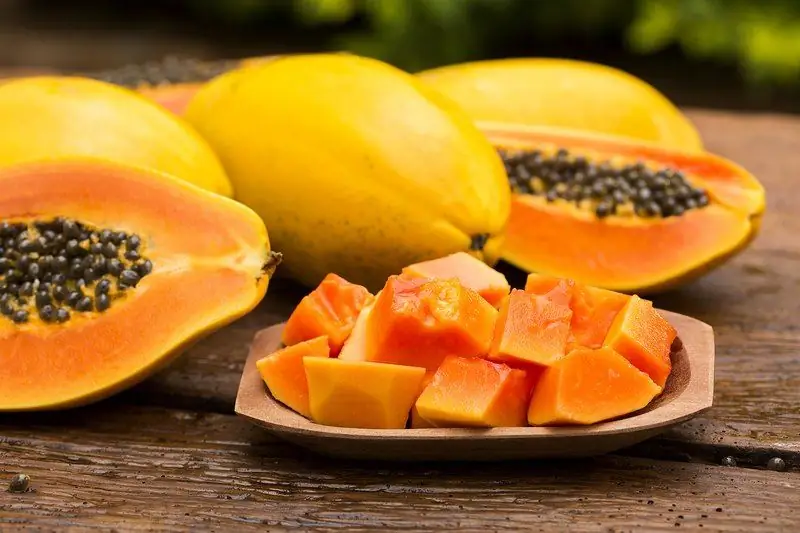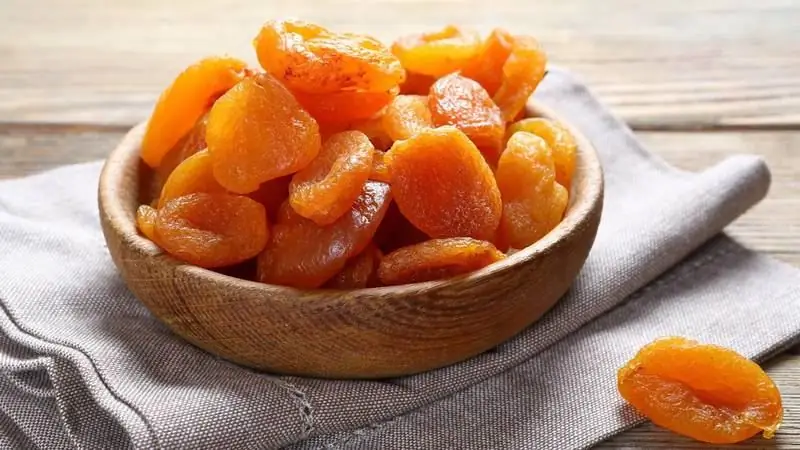
Table of contents:
- Author Bailey Albertson albertson@usefultipsdiy.com.
- Public 2023-12-17 12:53.
- Last modified 2025-01-23 12:41.
Coconut oil for food: will it benefit?

The cosmetic properties of coconut oil are widely known, and many do not even think about the fact that it can be used in food. This natural product with a high content of fatty acids can not only improve the condition of the skin and hair, but also become an excellent addition to any dish, saturating it with additional benefits.
What coconut oil can be used for food
Coconut oil can be used in food, but not every one. There are purely cosmetic formulations, they usually include additives that do not allow thickening, or additional ingredients for the benefit of the skin and hair. The second type is edible oil, it is more versatile (it can be used both in food and as a cosmetic product). It is sold in grocery stores, usually in large cans (for cosmetic purposes, oil is often packed in small containers) and the packaging will necessarily have a note on the purpose of the product.

The packaging must be marked as good for cooking
There are several varieties of coconut oil:
- cold-pressed oil (designation on the packaging Virgin coconut oil or VCO) - it is extracted by mechanical action on fresh coconut pulp. This is the most useful product, unrefined, but its yield is very small - no more than 10% of the initial mass of raw materials, therefore, its price is high;
- pure coconut oil - obtained from pressing the dried pulp of a nut. It is also an expensive unrefined product that is more commonly used for medical and cosmetic purposes;
- refined coconut oil (RBD) - obtained by chemical treatment of crude oil. It does not have a pronounced aroma or taste, but is more affordable due to the inexpensive production technology.
In cooking, both refined and unrefined products are allowed. The first type can be used to prepare absolutely any dish. But unrefined has a pronounced coconut aroma and flavor, so it is usually used in the creation of desserts. Considering the high cost of unrefined cold-pressed oils, it is precisely refined formulations that are widespread - they are more affordable and versatile.

Oil is obtained by squeezing coconut pulp
The benefits of oil when taken internally
The energy value of the product is 900 kcal per 100 grams. Almost entirely, the oil consists of saturated fatty acids (butyric, lauric, capric, stearic, etc.), mono- and polyunsaturated acids (oleic, nervous, omega-6 and 9). The peculiarity of the product is in the type of fatty acids - they have an average carbon chain length, unlike other oils, which have long ones. This allows you to achieve faster and more complete absorption in the intestines without increasing stress on the digestive tract and liver.
Table: Nutritional Information and Nutrient Content of Coconut Oil (Per 100g)
| Component | Content |
| Protein | 0 |
| Fats | 99.9 g |
| Carbohydrates | 0 |
| Water | 0.1 g |
| Alimentary fiber | 0 |
| Calcium | 0.2% |
| Vitamin E | 4.7% |
| Phosphorus | 0.3% |
| Iron | 0.2% |
| Vitamin K | 0.4% |
| Saturated fatty acids | 84.6 g |
| Omega-9 | 7.8 g |
| Omega-6 | 1.7 g |
Due to its composition, coconut oil provides a number of beneficial effects:
- improves the functioning of the thyroid gland;
- normalizes metabolic processes in the body (due to which the product is often used in the preparation of the diet of losing weight people);
- promote better assimilation of useful components entering the body, in particular calcium;
- improves liver function, its self-purification function and bile production.
Potential harm
Coconut oil is considered safe and rarely causes allergic reactions. There are no contraindications to eating it, but negative consequences can occur in the following situations:
- the product is of poor quality or spoiled (you can understand this by yellowing, the appearance of bitterness in the taste, the formation of crumbs in the overall texture, dark spots);
- Too much oil was eaten (more than the recommended rate of 1 tsp for a child and 2 tablespoons for an adult).
In the first case, a typical picture of poisoning with nausea, vomiting and general weakness, and with an "overdose" may overload the digestive tract, which often ends in indigestion and exacerbation of chronic diseases.
How to use coconut oil in food
The big advantage of the product is its unique resistance to high temperatures - it does not break down during cooking, therefore it transfers the maximum benefit and flavor to the finished dish. The plant product is suitable for frying, baking, stewing at temperatures up to 350 degrees without the formation of carcinogenic substances, which allows it to completely replace other types of cooking oils.

Coconut oil can be used as a substitute for any vegetable oil, including when cooking
The use of oil in cooking is not limited by anything. It can be used for any purpose:
- add to baked goods;
- complement the taste of cereals, especially during breakfast;
- use as a dressing for salads (here it is worth noting that in a cold room the oil will solidify, therefore this method is relevant either for the summer, or with the condition of preliminary melting;
- fry any meat, fish, vegetables, etc. on it.
If you wish, you can eat coconut oil in its pure form. The safe norm for children is 0.5-1 tsp. (and you can offer the first micro-doses from the very beginning of complementary foods at 6 months), and for adults - 1-2 tablespoons. You can eat an unusual product at any time you want, including on an empty stomach. For example, in order to improve the digestive processes, it is taken in the morning. Lovers of the product should pay attention to the so-called "manna" - a mixture of butter and chopped coconut pulp, which is great as a spread for cookies and an addition to sweet cereals.
Reviews
If coconut oil is labeled as edible, then it can be used in cooking without restriction. Unlike other oils, when heated, it does not lose its properties, so the dishes will be as useful as possible. It is considered a safe product and has no strict contraindications.
Recommended:
Papaya: Benefits And Harms For The Body Of Women And Men, Fresh Fruits And Dried Candied Fruits, Reviews

Should you include papaya in your diet and why? Does papaya help you lose weight? To whom this fruit is contraindicated. Customer reviews about eating papaya
Dates: The Benefits And Harms For The Body Of Women And Men Of Dried Fruits And Compote From Them, Reviews

Dates: benefits, harm, contraindications, calories. Consumer reviews and doctors' opinions
Pumpkin: Benefits And Harms To The Body, Including Seeds, Oils, For Men And Women, Reviews

Why is pumpkin useful? What effect does pumpkin pulp, its seeds, juice have on the body? How much pumpkin can be for adults and children. Pumpkin harm and contraindications
Dried Apricots: Benefits And Harms For The Body Of Women And Men, Reviews

Dried apricots: nutritional value, useful elements, possible harm. How much dried apricots can you eat per day
Coconut Milk: Benefits And Harms For Women, Men And Children

How is coconut milk different from coconut water? The benefits and harms of coconut milk, features of its chemical composition and use
